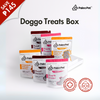Introduction
The stark contrast between the diets of wild wolves and our domesticated dogs provides a fascinating lens through which to examine dental health. While wolves roam free, subsisting on a diet honed by millions of years of evolution, our pet dogs often eat what we give them, which frequently includes carbohydrate-rich commercial pet foods.

Understanding how these dietary differences impact dental health can help us make better choices for our canine companions.
The Diet of Wild Wolves
Wolves, ancestors of our domestic dogs, primarily feed on prey they hunt in the wild. Their diet consists of raw meats, offal, and bones of large ungulates such as deer, elk, and moose, and is complemented by smaller mammals, birds, fish, and occasionally some plant matter.

This diet is high in protein and fats, with minimal to no carbohydrates. The physical act of hunting and consuming prey also plays a crucial role in maintaining their dental health. Tearing, ripping, and chewing raw meat and bones naturally helps reduce plaque and tartar build-up on their teeth.
The Nature of a Wolf's Teeth

The dental architecture of a wolf is designed for a carnivorous diet. Sharp and pointed canine teeth for tearing meat, thick molars and powerful jaws for crushing bones are essential parts that not only aid in feeding but also in keeping their teeth free from tartar build up. The abrasive action of chewing raw meat and bones effectively cleans teeth by mechanically scraping off plaque. This natural brushing mechanism is absent in most modern domestic dog diets.
Diet of Domestic Dogs

In contrast, the typical diet of a domestic dog is often quite different. Nowadays, commercial dog foods, wet, canned, and dry kibbles, are usually high in carbohydrates. Ingredients such as corn, wheat, and rice are common, which provide energy in a cost-effective manner.
During our dog’s feeding time some of the ingredients breaks down into sugars, which can adhere to their teeth and under the gums. This fosters the growth of bacteria, leading to plaque formation, tooth decay, and gum disease.
Dental Diseases in Domestic Dogs

Dental diseases or also known as Periodontal Disease are among the most common health problems in dogs, with studies indicating that over 80% of dogs over the age of three have some form of dental disease.
Once food debris stick to the enamel of a tooth, they get mixed with saliva and bacteria resulting to plaque build up. If a plaque is left on a tooth for too long it can accumulate into a tartar and will lodge on the tooth, under the gums and nearby teeth.
As the condition progress, it can result to halitosis, gingivitis, receding gum line, tooth decay, and can even cause serious systemic infections complicating the heart, liver, and kidneys.
Advantages of a Natural Diet

Some veterinarians and pet nutritionists advocate for diets which minimize carbohydrates for dogs, mimicking the ancestral diet of wolves. Proponents argue that such diets promote healthier teeth and gums due to their high protein content and the physical benefits of chewing raw meats and bones.
Moreover, consumption of natural diet for our furry companions also helps them in garnering vitamins, minerals and essential amino acids. This type of feeding also possesses omega fatty acids that helps in maintaining a healthy skin and coat and nourishes the body to keep the vital organs healthy. Natural feeding also contains good bacteria that helps in balancing the gut microbiome.

So not only do our furry loved ones get better dental health, there are also the additional benefits of weight control, reduction in allergies and less systematic inflammation.
However, it's crucial to approach natural diets carefully. Including a variety of meats as well as nutrient dense organs goes a long way, ensuring that diets are balanced and safe to prevent adverse effects from deficiencies.
Conclusion
The disparity in dental health between wolves and many domestic dogs highlights the significant impact diet can have on oral hygiene.

Wolves benefit from a diet that mechanically helps maintain dental health and provides nutrients in proportions that their bodies are evolutionarily adapted to utilize efficiently. The lesson from wolves is clear: diet profoundly affects dental health.
-
Mechanical Cleaning: The process of chewing tough, raw materials helps keep wolves' teeth clean. Domestic dogs that are fed primarily with soft, wet foods or carbohydrate-rich kibble miss out on this natural cleaning. Even when dry kibble is used, it often lacks the necessary toughness to significantly scrub teeth surfaces effectively.
- Carbohydrates and Sugars: The high carbohydrate content in many dog foods leads to sugar residues on the teeth, promoting bacterial growth and plaque formation. Over time, this can progress to tartar build-up, gum disease, and tooth decay.
For our domestic dogs, incorporating aspects of their ancestral diet could improve their dental hygiene and overall health. This might mean choosing dog foods that are lower in carbohydrates and higher in protein or even safely integrating raw foods and appropriate chew toys to mimic the tooth-cleaning effects of a wild diet.
By understanding the dietary roots of wolves, we can enhance our approach to feeding domestic dogs, aiming not just to satisfy them nutritionally but also to use their diet as a tool for maintaining dental health. As we continue to evolve in our understanding and care for our pets, revisiting and incorporating the wisdom of the wild may hold the key to better health and happier lives for our beloved canine companions.

